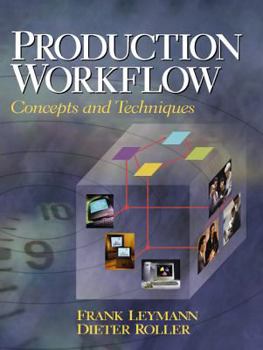Production Workflow: Concepts and Techniques
Suicide cannot be read as simply another novel "it is, in a sense, the author "s own oblique, public suicide note, a unique meditation on this most extreme of refusals. Presenting itself as an... This description may be from another edition of this product.
Format:Paperback
Language:English
ISBN:0130217530
ISBN13:9780130217530
Release Date:January 1999
Publisher:Prentice Hall
Length:479 Pages
Weight:2.15 lbs.
Dimensions:9.3" x 1.3" x 7.0"
Customer Reviews
2 ratings
Comprehensive
Published by Thriftbooks.com User , 25 years ago
This is a good book. It covers a wider range of topics and provides more details than any other workflow book I read. The authors target technical people who are interested in building, evaluating, or using workflow systems. The book doesn't provide all the implementation details you would need to build a workflow system, though. But once you read it you'll have a better idea about what it takes to do it.The first part of the book discusses concepts relevant to workflow management. The authors cover a wide range of topics, from business processes to workflow basics to advanced workflow features like dynamic modification of workflows. However, some concepts don't fit in as nicely as others, which makes it seem unfinished. For example, in Chapter 4 the authors present in great detail a formal workflow metamodel. But 63 pages later they don't show how the reader can use this formal treatment: "One of the advantages of representing a metamodel in a formal manner is that one can prove statements formulated in the corresponding language. In our case, properties of process model graphs can their instances can be derived." The chapter ends with a 1/2 page (sketch of a) process termination proof.The second part of the book focuses on techniques for implementing workflow systems. Here the authors discuss objects, transactions, advanced workflow functionality, and the architecture of workflow systems and workflow-based applications. These chapters seem more biased by IBM's MQSeries Workflow system (with which both authors have been involved) than claimed in the preface. Therefore, the presentation revolves around the techniques used in IBM's product and shadows other alternatives. Many discussions in this book are followed by examples in the Flow Definition Language used by MQSeries Workflow. There are two problems with this approach. First, unless the reader uses the same workflow system, I question its value. Second, the FDL examples focus on specification rather than implementation. Probably the majority of readers are interested in the latter (which is missing) rather than the former. In fact, throughout the 2nd part the presentation of different techniques remains on a conceptual level.Object technology seems an afterthought. While you can find the word "object" quite often, this book doesn't show how workflow management systems can benefit from object-oriented technology. The authors regard objects as components that merely encapsulate the implementations workflow activities. Their treatment ignores the other key features of object-orientation (inheritance and polymorphism). Incidentally, Chapter 6 (Workflow and Objects) is one of the shortest chapters in the book.Some additional comments:- There are a few places where the authors provide basic background information which probably should be left out. For example, Section 10.1.1 on Availability introduces MTBF and MTTR. In my opinion, unless this discussion
The best book I've read on workflow today
Published by Thriftbooks.com User , 26 years ago
A really complete book on workflow covering both technical and business aspects. A must-read for anybody who wants a coverage of both practical and theoretical issues of WF Management. More oriented towards technical people than business people and very useful as a basis for lectures on the topic. It could have covered other WFMS and models than only MQ-series in order to be more complete, but as the focus is mainly put on models and architecture the book does not appear as a IBM white paper. Anyway, this is already a very good book on Workflow and the best I've read today.






